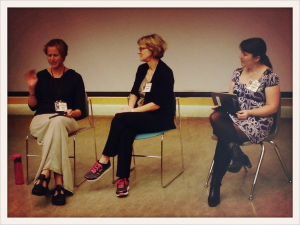
Me, Laura Mandell, and Laura Estill at DHSI 2014 Birds of a Feather (5 June 2014) Photo by Michael Ullyot.
The question:
What responsibility do we have to prepare emerging digital humanists for careers in and out of the academy, and how are we working to meet those goals?
The mission: “to explore strange new worlds, to seek out new life and new civilizations, to boldly go where no one has gone before.”
Oh wait—that’s a different “Next Generation” . . .
More seriously, to my mind, there are three things that we can and should do (and I should add that my remarks here are colored by the fact that my “we” is speaking from a specific subject position: a tenured English professor who works almost exclusively with undergraduate students at a teaching-intensive institution—your “we” is probably different in some key ways)
The first is actually related to the Star Trek mission that I opened with, and that’s to trail-blaze. To venture off the beaten path and explore new and uncharted territory. To try new things both in our scholarship as well as in our classes. The most obvious example of this pedagogically speaking, it to develop DH classes, but not everyone might have the opportunity or the interest in doing a dedicated DH course.
But we might incorporate digital tools into our history or literature courses—word clouds for example. Equally important here, for all students, is for us to encourage the kind of critical thinking about technology that Aimee Morrison talked about in her keynote on Monday—thinking about how digital interfaces shape our relationships and our thinking in subtle but fundamental ways—like the way the status update construction encourages a particular subject position or the implications of have a “like” button but no “dislike” to counterbalance.
But trail-blazing, at least in the hiking sense, isn’t only about exploration. It’s also about marking the way so that others can follow in our footsteps and not get lost. In DH terms, we might think back to Vanevar Bush’s 1945 essay, “As We May Think.” Bush imagines not just a system of knowledge that is hyperlinked (a la HTML and early WWW texts) but a system in which readers blaze trails for others who come after them to follow. I want to see this happening in a few ways: the practical—actual documentation of our practices whether in essays, articles, blog posts, or even (gasp!) the monograph (hat tip Jentery Sayers!) and maintenance of our projects (making sure that links work, for example, the the web domain is still viable). But in addition to these documentary practices, I’m also thinking in terms of the personal. Sharing our work and making it available and accessible to interested parties. Having conversations with people and making connections between people with mutual interests..
But trail-blazing is sometimes more successful than others. Sometimes we hit dead ends. Sometimes we find ourselves in the middle of a patch of poison oak, not that that has ever happened to me. My point is that we will make mistakes. We will fail. Everybody does. But failure makes many academics very uncomfortable. At this point, it’s worth acknowledging that there are plenty of occasions where failure can have serious consequences. But it’s also, I think, important to point out that failure, in a strange way, can be a kind of privilege, a luxury. So those of us who have that privilege need to exercise it. And here, to return to the hiking metaphor, is where the terrain gets technical, so I want to trend carefully. To be clear: I’m not telling you all to go blow stuff up, either figuratively or literally. I’m not talking about being careless. To admit that we have made a mistake is to admit vulnerability, and certainly, as a woman, I’m familiar with the presumption of technological incompetence that is so frequently attached to my gender. We talk a great deal about our successes, our accomplishments, and our expertise. But we also need to acknowledge that failure is a very real part of innovation, and we need to talk about it. This is one of the features of ProfHacker of which I am most proud. We talk about things that have gone wrong. As academics, many of us don’t like to be wrong, and we are hard on ourselves when we make mistakes. Moreover, failure is perceived differently for men and women, so in advocating failure, I am running the very real risk of reinforcing stereotypes about women and technology. But at the same time, making mistakes is an essential part of learning, and it’s important to confront these expectations.
And that brings me to my last point: we need to be willing to be uncomfortable. We need to be willing to have difficult conversations about issues like gender, race, and disability. We need to be able to disagree with each other in ways that move a conversation forward instead of shutting it down. And we need to be willing to listen even if certain things are hard to hear. One of the critiques of social media networks like Twitter is that it can often function as a kind of echo chamber where we only engage with those who are already share our perspectives or world-view. We need to make a concerted effort to broaden our networks to include difference.
